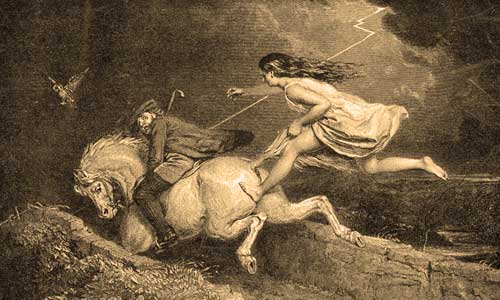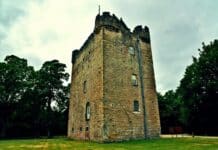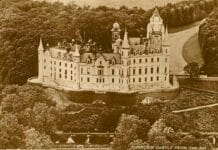ONE of the most thrilling and spooky stories in the English language wasn’t even written in English.

The tale of Tam o’Shanter – a nocturnal jaunt through the Ayrshire countryside – is a heart-pounding poem written in Scots by the immortal Scottish bard Robbie Burns.
25 January is Robert Burns’ birthday and tonight throughout the world, people from all nations will salute Burns and his vast contribution to literature.
Robbie Burns (1759-1796) lead an amazing life in the short span of 37 years. He worked as an excise officer on the south-west coast of Scotland when smuggling was rife, had countless affairs, fathered many children and become Scotland’s greatest and most beloved writer ever. He was essentially a cross between James Bond and a rock star – someone to be loved and admired.
Burn’s effect not only on Scotland but humanity includes writing Auld Lang Syne, which is sung every New Year’s Eve across the globe, and influencing poets, writers and songwriters from William Wordsworth to Bob Dylan. People might not know his name but they know his influence.
As I have mentioned in The Spooky Isles before, my mother was born in Ayrshire and I have visit Burns Country numerous times. Not only can you visit the cottage were Burns was born and his family’s kirkyard in Alloway, you can visit the Tam o’Shanter Pub and The Tam o’Shanter Experience, both named oddly-enough after Tam o’Shanter – Burn’s most famous paranormal poem.
Tam o’Shanter is my favourite Burns’ poem and I am not the only one to love it. A recent YouGov survey last week revealed 23% of Scotls rate the supernatural yarn their favourite too. .
Written in 1790, Tam o’Shanter – which also lends its name to the little bonnet with the pom-pom on top – is one of Burns’ longest poems and charts the action-packed evening of a drunk, who witnesses strange goings on at the church and is chased by demons through the countryside on his faithful nag, Maggie.
The church in question is the Alloway Kirk, which while mostly in ruins today, can still be visited.
(You can see the headstone of Robbie’s father, William, and it is very much a stereotypical, almost Hollywood version of a graveyard.) On the fateful night that old Tam piled past full of booze on his mare, warlocks and witches had taken over the kirk, dancing up a storm with the Devil himself. Tam resisted their seductive invitation to join their satanic orgy. They chased him but he escaped their clutches but Maggie carried Tam across the river (bogies and beasties can’t travel across running water) and to safety (and a seriously cross wife!)
Tam o’Shanter is funny, exciting, scary, all the emotions you would want from an epic poem.
For your enjoyment, here is the poem in its entirety.
Tam o’Shanter
When chapmen billies leave the street,
And drouthy neibors, neibors meet,
As market days are wearing late,
An’ folk begin to tak the gate;
While we sit bousing at the nappy,
And getting fou and unco happy,
We think na on the lang Scots miles,
The mosses, waters, slaps, and styles,
That lie between us and our hame,
Where sits our sulky sullen dame.
Gathering her brows like gathering storm,
Nursing her wrath to keep it warm.
This truth fand honest Tam o’ Shanter,
As he frae Ayr ae night did canter,
(Auld Ayr, wham ne’er a town surpasses
For honest men and bonie lasses.)
O Tam! had’st thou but been sae wise,
As ta’en thy ain wife Kate’s advice!
She tauld thee weel thou was a skellum,
A blethering, blustering, drunken blellum;
That frae November till October,
Ae market-day thou was nae sober;
That ilka melder, wi’ the miller,
Thou sat as lang as thou had siller;
That every naig was ca’d a shoe on,
The smith and thee gat roaring fou on;
That at the Lord’s house, even on Sunday,
Thou drank wi’ Kirkton Jean till Monday.
She prophesied that late or soon,
Thou would be found deep drown’d in Doon;
Or catch’d wi’ warlocks in the mirk,
By Alloway’s auld haunted kirk.
Ah, gentle dames! it gars me greet,
To think how mony counsels sweet,
How mony lengthen’d, sage advices,
The husband frae the wife despises!
But to our tale:– Ae market-night,
Tam had got planted unco right;
Fast by an ingle, bleezing finely,
Wi’ reaming swats, that drank divinely
And at his elbow, Souter Johnny,
His ancient, trusty, drouthy crony;
Tam lo’ed him like a vera brither–
They had been fou for weeks thegither!
The night drave on wi’ sangs and clatter
And ay the ale was growing better:
The landlady and Tam grew gracious,
wi’ favours secret,sweet and precious
The Souter tauld his queerest stories;
The landlord’s laugh was ready chorus:
The storm without might rair and rustle,
Tam did na mind the storm a whistle.
Care, mad to see a man sae happy,
E’en drown’d himsel’ amang the nappy!
As bees flee hame wi’ lades o’ treasure,
The minutes wing’d their way wi’ pleasure:
Kings may be blest, but Tam was glorious.
O’er a’ the ills o’ life victorious!
But pleasures are like poppies spread,
You sieze the flower, its bloom is shed;
Or like the snow falls in the river,
A moment white–then melts for ever;
Or like the borealis race,
That flit ere you can point their place;
Or like the rainbow’s lovely form
Evanishing amid the storm.–
Nae man can tether time or tide;
The hour approaches Tam maun ride;
That hour, o’ night’s black arch the key-stane,
That dreary hour he mounts his beast in;
And sic a night he taks the road in
As ne’er poor sinner was abroad in.
The wind blew as ‘twad blawn its last;
The rattling showers rose on the blast;
The speedy gleams the darkness swallow’d
Loud, deep, and lang, the thunder bellow’d:
That night, a child might understand,
The Deil had business on his hand.
Weel mounted on his gray mare, Meg–
A better never lifted leg–
Tam skelpit on thro’ dub and mire;
Despisin’ wind and rain and fire.
Whiles holding fast his gude blue bonnet;
Whiles crooning o’er some auld Scots sonnet;
Whiles glowring round wi’ prudent cares,
Lest bogles catch him unawares:
Kirk-Alloway was drawing nigh,
Whare ghaists and houlets nightly cry.
By this time he was cross the ford,
Whare, in the snaw, the chapman smoor’d;
And past the birks and meikle stane,
Whare drunken Chairlie brak ‘s neck-bane;
And thro’ the whins, and by the cairn,
Whare hunters fand the murder’d bairn;
And near the thorn, aboon the well,
Whare Mungo’s mither hang’d hersel’.–
Before him Doon pours all his floods;
The doubling storm roars thro’ the woods;
The lightnings flash from pole to pole;
Near and more near the thunders roll:
When, glimmering thro’ the groaning trees,
Kirk-Alloway seem’d in a bleeze;
Thro’ ilka bore the beams were glancing;
And loud resounded mirth and dancing.
Inspiring bold John Barleycorn!
What dangers thou canst make us scorn!
Wi’ tippeny, we fear nae evil;
Wi’ usquabae, we’ll face the devil!–
The swats sae ream’d in Tammie’s noddle,
Fair play, he car’d na deils a boddle.
But Maggie stood, right sair astonish’d,
Till, by the heel and hand admonish’d,
She ventured forward on the light;
And, vow! Tam saw an unco sight
Warlocks and witches in a dance;
Nae cotillion brent-new frae France,
But hornpipes, jigs strathspeys, and reels,
Put life and mettle in their heels.
A winnock-bunker in the east,
There sat auld Nick, in shape o’ beast;
A towzie tyke, black, grim, and large,
To gie them music was his charge:
He scre’d the pipes and gart them skirl,
Till roof and rafters a’ did dirl.–
Coffins stood round, like open presses,
That shaw’d the dead in their last dresses;
And by some develish cantraip slight,
Each in its cauld hand held a light.–
By which heroic Tam was able
To note upon the haly table,
A murders’s banes in gibbet-airns;
Twa span-lang, wee, unchristen’d bairns;
A thief, new-cutted frae a rape,
Wi’ his last gasp his gab did gape;
Five tomahawks, wi blude red-rusted;
Five scymitars, wi’ murder crusted;
A garter, which a babe had strangled;
A knife, a father’s throat had mangled,
Whom his ain son o’ life bereft,
The gray hairs yet stack to the heft;
Wi’ mair o’ horrible and awfu’,
Which even to name was be unlawfu’.
Three lawyers’ tongues, turn’d inside out,
Wi’ lies seam’d like a beggar’s clout;
Three priests’ hearts, rotten, black as muck,
Lay stinking, vile in every neuk.
As Tammie glowr’d, amaz’d, and curious,
The mirth and fun grew fast and furious;
The piper loud and louder blew;
The dancers quick and quicker flew;
They reel’d, they set, they cross’d, they cleekit,
Till ilka carlin swat and reekit,
And coost her duddies to the wark,
And linket at it in her sark!
Now Tam, O Tam! had thae been queans,
A’ plump and strapping in their teens,
Their sarks, instead o’ creeshie flannen,
Been snaw-white seventeen hunder linnen!
Thir breeks o’ mine, my only pair,
That ance were plush, o’ gude blue hair,
I wad hae gi’en them off my hurdies,
For ae blink o’ the bonie burdies!
But wither’d beldams, auld and droll,
Rigwoodie hags wad spean a foal,
Louping and flinging on a crummock,
I wonder did na turn thy stomach!
But Tam kend what was what fu’ brawlie:
There was ae winsome wench and waulie,
That night enlisted in the core,
Lang after ken’d on Carrick shore;
(For mony a beast to dead she shot,
And perish’d mony a bonie boat,
And shook baith meikle corn and bear,
And kept the country-side in fear.)
Her cutty-sark, o’ Paisley harn
That while a lassie she had worn,
In longitude tho’ sorely scanty,
It was her best, and she was vauntie,-
Ah! little ken’d thy reverend grannie,
That sark she coft for he wee Nannie,
Wi’ twa pund Scots, (’twas a’ her riches),
Wad ever grac’d a dance of witches!
But here my Muse her wing maun cour;
Sic flights are far beyond her pow’r;
To sing how Nannie lap and flang,
(A souple jade she was, and strang),
And how Tam stood, like ane bewitch’d,
And thought his very een enrich’d;
Even Satan glowr’d, and fidg’d fu’ fain,
And hotch’d and blew wi’ might and main;
Till first ae caper, syne anither,
Tam tint his reason ‘ thegither,
And roars out, “Weel done, Cutty-sark!”
And in an instant all was dark:
And scarcely had he Maggie rallied,
When out the hellish legion sallied.
As bees bizz out wi’ angry fyke,
When plundering herds assail their byke;
As open pussie’s mortal foes,
When, pop! she starts before their nose;
As eager runs the market-crowd,
When “Catch the thief!” resounds aloud;
So Maggie runs, the witches follow,
Wi’ mony an eldritch skriech and hollo.
Ah, Tam! ah, Tam! thou’ll get thy fairin’!
In hell they’ll roast thee like a herrin’!
In vain thy Kate awaits thy commin’!
Kate soon will be a woefu’ woman!
Now, do thy speedy utmost, Meg,
And win the key-stane o’ the brig;
There at them thou thy tail may toss,
A running stream they dare na cross.
But ere the key-stane she could make,
The fient a tail she had to shake!
For Nannie, far before the rest,
Hard upon noble Maggie prest,
And flew at Tam wi’ furious ettle;
But little wist she Maggie’s mettle –
Ae spring brought off her master hale,
But left behind her ain gray tail;
The carlin claught her by the rump,
And left poor Maggie scarce a stump.
No, wha this tale o’ truth shall read,
Ilk man and mother’s son take heed;
Whene’er to drink you are inclin’d,
Or cutty-sarks run in your mind,
Think! ye may buy joys o’er dear –
Remember Tam o’ Shanter’s mare.
For the easier-to-read (but not as fun) English translation read here.
Interesting fact: Tam o’Shanter is commonly spelt with a capital O because folk believe it is an Irish surname. But the ‘o’ tells us that Tam is ‘of’ Shanter. Where Shanter is, I do not know.







